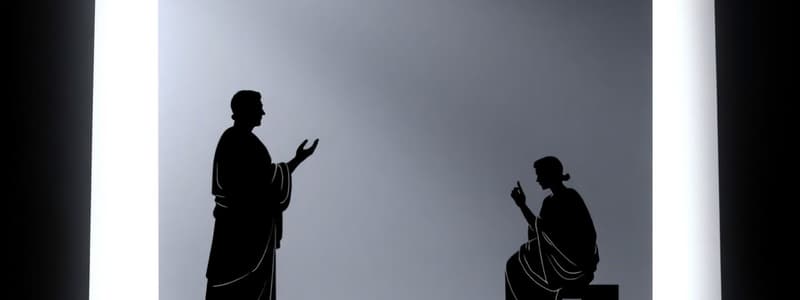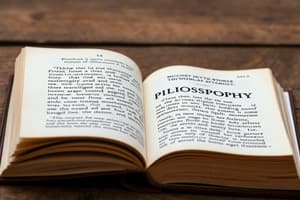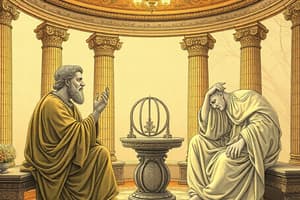Podcast
Questions and Answers
According to Socrates, why is Anytus angry?
According to Socrates, why is Anytus angry?
What does Socrates suggest about the men who claim to be teachers of virtue?
What does Socrates suggest about the men who claim to be teachers of virtue?
What is Socrates' primary argument against the claim that virtue can be taught?
What is Socrates' primary argument against the claim that virtue can be taught?
Why does Socrates bring up the sophists in the conversation?
Why does Socrates bring up the sophists in the conversation?
Signup and view all the answers
What does Meno imply about Gorgias?
What does Meno imply about Gorgias?
Signup and view all the answers
What is the main purpose of the passage about Theognis?
What is the main purpose of the passage about Theognis?
Signup and view all the answers
Which of the following best describes the relationship between Socrates and Anytus in this excerpt?
Which of the following best describes the relationship between Socrates and Anytus in this excerpt?
Signup and view all the answers
What is the overall tone of the passage?
What is the overall tone of the passage?
Signup and view all the answers
What does Socrates express a desire for in his conversation with Meno?
What does Socrates express a desire for in his conversation with Meno?
Signup and view all the answers
How does Meno define virtue during his discussion with Socrates?
How does Meno define virtue during his discussion with Socrates?
Signup and view all the answers
What assumption does Socrates challenge regarding people's desires?
What assumption does Socrates challenge regarding people's desires?
Signup and view all the answers
According to Socrates, what do some individuals believe about bad things?
According to Socrates, what do some individuals believe about bad things?
Signup and view all the answers
What perspective does Meno hold regarding bad desires?
What perspective does Meno hold regarding bad desires?
Signup and view all the answers
What concept does Socrates explore about the relationship between desire and knowledge?
What concept does Socrates explore about the relationship between desire and knowledge?
Signup and view all the answers
What does Meno ultimately struggle to accept regarding people's beliefs about bad things?
What does Meno ultimately struggle to accept regarding people's beliefs about bad things?
Signup and view all the answers
What role does the idea of virtue play in Socrates and Meno's conversation?
What role does the idea of virtue play in Socrates and Meno's conversation?
Signup and view all the answers
What does Socrates conclude about those who desire bad things?
What does Socrates conclude about those who desire bad things?
Signup and view all the answers
According to Socrates, what is virtue?
According to Socrates, what is virtue?
Signup and view all the answers
How does Meno differentiate between virtue and wickedness?
How does Meno differentiate between virtue and wickedness?
Signup and view all the answers
What examples of good things does Meno provide?
What examples of good things does Meno provide?
Signup and view all the answers
What assumption does Socrates challenge regarding desire?
What assumption does Socrates challenge regarding desire?
Signup and view all the answers
How does Socrates link knowledge and the desire for good?
How does Socrates link knowledge and the desire for good?
Signup and view all the answers
What does Socrates imply about happiness and misery?
What does Socrates imply about happiness and misery?
Signup and view all the answers
What does Meno attribute to the acquisition of good things?
What does Meno attribute to the acquisition of good things?
Signup and view all the answers
What is the main discussion between Socrates and Anytus?
What is the main discussion between Socrates and Anytus?
Signup and view all the answers
What does Socrates argue is necessary for human activities to be good?
What does Socrates argue is necessary for human activities to be good?
Signup and view all the answers
What does Socrates suggest about the good men of Athens?
What does Socrates suggest about the good men of Athens?
Signup and view all the answers
According to Socrates, how is virtue related to knowledge?
According to Socrates, how is virtue related to knowledge?
Signup and view all the answers
According to the conversation, what skill did Themistocles teach his son?
According to the conversation, what skill did Themistocles teach his son?
Signup and view all the answers
How does Socrates evaluate the relationship between virtue and teaching?
How does Socrates evaluate the relationship between virtue and teaching?
Signup and view all the answers
What assumption does Socrates challenge regarding the nature of the good?
What assumption does Socrates challenge regarding the nature of the good?
Signup and view all the answers
What implication does Socrates make about Themistocles' intentions for his son?
What implication does Socrates make about Themistocles' intentions for his son?
Signup and view all the answers
What conclusion does Meno reach regarding virtue and knowledge?
What conclusion does Meno reach regarding virtue and knowledge?
Signup and view all the answers
What critical question does Socrates pose about the teachability of virtue?
What critical question does Socrates pose about the teachability of virtue?
Signup and view all the answers
What aspect of Athenian gentlemen is Anytus defending?
What aspect of Athenian gentlemen is Anytus defending?
Signup and view all the answers
What conclusion does Socrates draw regarding a person's natural talents?
What conclusion does Socrates draw regarding a person's natural talents?
Signup and view all the answers
What implication does Socrates suggest if there are no teachers of virtue?
What implication does Socrates suggest if there are no teachers of virtue?
Signup and view all the answers
What conclusion can be drawn about the history of virtue in Athens from the conversation?
What conclusion can be drawn about the history of virtue in Athens from the conversation?
Signup and view all the answers
How does Socrates view the upbringing of naturally good individuals?
How does Socrates view the upbringing of naturally good individuals?
Signup and view all the answers
What outcome does Socrates advocate for regarding virtue's definition?
What outcome does Socrates advocate for regarding virtue's definition?
Signup and view all the answers
What is Socrates' view on the soul in relation to knowledge?
What is Socrates' view on the soul in relation to knowledge?
Signup and view all the answers
Which statement reflects Socrates' belief about seeking knowledge?
Which statement reflects Socrates' belief about seeking knowledge?
Signup and view all the answers
What does Meno want to discuss regarding virtue?
What does Meno want to discuss regarding virtue?
Signup and view all the answers
How does Socrates suggest they should investigate the qualities of virtue?
How does Socrates suggest they should investigate the qualities of virtue?
Signup and view all the answers
What is implied about the nature of virtue according to the conversation?
What is implied about the nature of virtue according to the conversation?
Signup and view all the answers
What role does Meno believe he is playing in the conversation with Socrates?
What role does Meno believe he is playing in the conversation with Socrates?
Signup and view all the answers
What does Socrates indicate about the pursuit of knowledge?
What does Socrates indicate about the pursuit of knowledge?
Signup and view all the answers
What assumption does Socrates suggest they explore regarding virtue?
What assumption does Socrates suggest they explore regarding virtue?
Signup and view all the answers
Flashcards
Virtue
Virtue
Virtue is the quality of desiring beautiful things and having the power to acquire them.
Desiring Good Things
Desiring Good Things
People generally desire good things, even if they sometimes desire bad things mistakenly.
Desiring Bad Things
Desiring Bad Things
Some people desire bad things, believing they are good or ignoring their harm.
Knowledge of Harm
Knowledge of Harm
Signup and view all the flashcards
Empedocles
Empedocles
Signup and view all the flashcards
Power to Acquire
Power to Acquire
Signup and view all the flashcards
Belief vs. Knowledge
Belief vs. Knowledge
Signup and view all the flashcards
Socratic Method
Socratic Method
Signup and view all the flashcards
Immortal Soul
Immortal Soul
Signup and view all the flashcards
Recollection Theory
Recollection Theory
Signup and view all the flashcards
Virtue Inquiry
Virtue Inquiry
Signup and view all the flashcards
Teachability of Virtue
Teachability of Virtue
Signup and view all the flashcards
Finding the Unknown
Finding the Unknown
Signup and view all the flashcards
Rule and Freedom in Learning
Rule and Freedom in Learning
Signup and view all the flashcards
Hypothetical Investigations
Hypothetical Investigations
Signup and view all the flashcards
Socrates' Argument
Socrates' Argument
Signup and view all the flashcards
Learning and Virtue
Learning and Virtue
Signup and view all the flashcards
Goodness by Nature
Goodness by Nature
Signup and view all the flashcards
Knowledge vs. Virtue
Knowledge vs. Virtue
Signup and view all the flashcards
Meno's Dilemma
Meno's Dilemma
Signup and view all the flashcards
Desire for Good
Desire for Good
Signup and view all the flashcards
Knowledge and Desire
Knowledge and Desire
Signup and view all the flashcards
Harm and Misery
Harm and Misery
Signup and view all the flashcards
Virtue Defined
Virtue Defined
Signup and view all the flashcards
Acquisition of Good Things
Acquisition of Good Things
Signup and view all the flashcards
Just vs. Unjust Acquisition
Just vs. Unjust Acquisition
Signup and view all the flashcards
Unhappiness from Bad
Unhappiness from Bad
Signup and view all the flashcards
Comparison of Virtue
Comparison of Virtue
Signup and view all the flashcards
Teaching Virtue
Teaching Virtue
Signup and view all the flashcards
Good Men vs. Good Teachers
Good Men vs. Good Teachers
Signup and view all the flashcards
Themistocles
Themistocles
Signup and view all the flashcards
Ability to Pass On Virtue
Ability to Pass On Virtue
Signup and view all the flashcards
Meno's Investigation
Meno's Investigation
Signup and view all the flashcards
Natural Talent Limitations
Natural Talent Limitations
Signup and view all the flashcards
Role of Teachers in Virtue
Role of Teachers in Virtue
Signup and view all the flashcards
Public Affairs and Virtue
Public Affairs and Virtue
Signup and view all the flashcards
Influence of Great House
Influence of Great House
Signup and view all the flashcards
Anytus' Anger
Anytus' Anger
Signup and view all the flashcards
Agreement on Teaching Virtue
Agreement on Teaching Virtue
Signup and view all the flashcards
Socrates' Critique of Sophists
Socrates' Critique of Sophists
Signup and view all the flashcards
Theognis' Perspective
Theognis' Perspective
Signup and view all the flashcards
Public Men's Views
Public Men's Views
Signup and view all the flashcards
Study Notes
Meno Dialogue Summary
- Meno, a Thessalian aristocrat, seeks Socrates' opinion on whether virtue can be taught.
- The dialogue begins abruptly without context or introduction.
- Meno questions Socrates about whether virtue is innate, learned through practice, or a gift from birth.
- Socrates' initial response is that he doesn't know.
- A geometrical illustration follows, where a slave intuitively solves a geometrical problem through questioning, suggesting "recollection" of inherent knowledge.
- Socrates challenges Meno on his definition of virtue.
- Meno lists diverse examples (e.g., virtue of men, women, children) suggesting virtue is multifaceted and varies depending on societal roles.
- Socrates counters by suggesting virtue is a single, universal concept that is always good.
- Socrates questions Meno about nature and practice of virtue.
- Meno notes that some men do bad things, believing them to be good.
- Socrates and Meno debate if virtue is associated with the ability to rule justly and is a type of knowledge.
- The nature of virtue is an ongoing topic of debate throughout the dialogue.
- The possibility of recalling innate knowledge is presented.
Key Philosophical Concepts
- Recollection (anamnesis): The idea that learning is not about acquiring new knowledge, but instead recollecting pre-existing knowledge residing in the soul.
- Virtue: A central concept debated; Socrates argues for a single form of virtue, while Meno presents various contextualized virtues.
- Knowledge vs. Right Opinion: Socrates distinguishes between true belief (right opinion) and justified true belief (knowledge). He argues that knowledge is superior to right opinion as it includes understanding of why the belief is true.
- Forms (Plato): The philosophical concept of Forms is hinted at; there is an underlying, ideal form of a thing that is more real than its manifestation in the physical world.
- Immortality of the Soul: The idea that the soul is immortal and has existed throughout time, leading to the idea that knowledge is recollection of the previously existing truths.
Dialogue Structure and Method
- The dialogue is a Socratic method of inquiry.
- Socrates uses questioning to challenge and prod Meno.
- Socrates leads Meno through the process of self-discovery and recollection.
- The dialogue never arrives at a definitive agreed-upon answer to the question of the nature of virtue.
Studying That Suits You
Use AI to generate personalized quizzes and flashcards to suit your learning preferences.
Related Documents
Description
Explore the complexities of Socratic thought in Meno's dialogues. This quiz delves into Anytus' anger, the nature of virtue, and Socrates' arguments regarding the teachability of virtue. Examine relationships between characters and the overall tone of the discussions.




